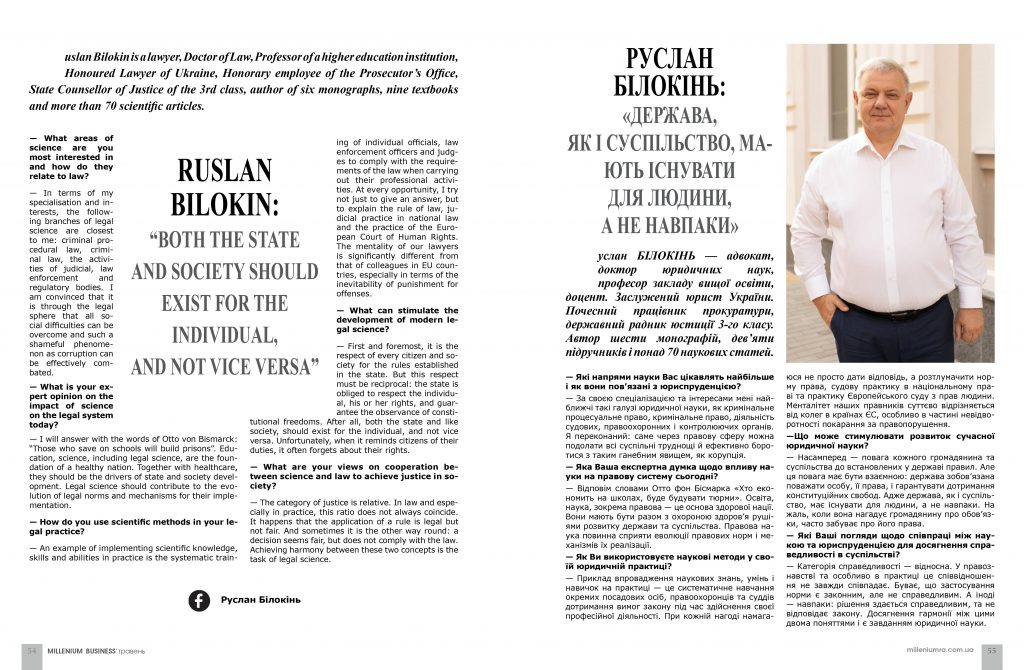Руслан БІЛОКІНЬ — адвокат, доктор юридичних наук, професор закладу вищої освіти, доцент. Заслужений юрист України. Почесний працівник прокуратури, державний радник юстиції 3-го класу. Автор шести монографій, дев’яти підручників і понад 70 наукових статей.

— Які напрями науки Вас цікавлять найбільше і як вони пов’язані з юриспруденцією?
— За своєю спеціалізацією та інтересами мені найближчі такі галузі юридичної науки, як кримінальне процесуальне право, кримінальне право, діяльність судових, правоохоронних і контролюючих органів. Я переконаний: саме через правову сферу можна подолати всі суспільні труднощі й ефективно боротися з таким ганебним явищем, як корупція.
— Яка Ваша експертна думка щодо впливу науки на правову систему сьогодні?
— Відповім словами Отто фон Бісмарка «Хто економить на школах, буде будувати тюрми». Освіта, наука, зокрема правова — це основа здорової нації. Вони мають бути разом з охороною здоров’я рушіями розвитку держави та суспільства. Правова наука повинна сприяти еволюції правових норм і механізмів їх реалізації.
— Як Ви використовуєте наукові методи у своїй юридичній практиці?
— Приклад впровадження наукових знань, умінь і навичок на практиці — це систематичне навчання окремих посадових осіб, правоохоронців та суддів дотримання вимог закону під час здійснення своєї професійної діяльності. При кожній нагоді намагаюся не просто дати відповідь, а розтлумачити норму права, судову практику в національному праві та практику Європейського суду з прав людини. Менталітет наших правників суттєво відрізняється від колег в країнах ЄС, особливо в частині невідворотності покарання за правопорушення.
—Що може стимулювати розвиток сучасної юридичної науки?
— Насамперед — повага кожного громадянина та суспільства до встановлених у державі правил. Але ця повага має бути взаємною: держава зобов’язана поважати особу, її права, і гарантувати дотримання конституційних свобод. Адже держава, як і суспільство, має існувати для людини, а не навпаки. На жаль, коли вона нагадує громадянину про обов’язки, часто забуває про його права.
— Які Ваші погляди щодо співпраці між наукою та юриспруденцією для досягнення справедливості в суспільстві?
— Категорія справедливості — відносна. У правознавстві та особливо в практиці це співвідношення не завжди співпадає. Буває, що застосування норми є законним, але не справедливим. А іноді — навпаки: рішення здається справедливим, та не відповідає закону. Досягнення гармонії між цими двома поняттями і є завданням юридичної науки.
RUSLAN BILOKIN: “BOTH THE STATE AND SOCIETY SHOULD EXIST FOR THE INDIVIDUAL, AND NOT VICE VERSA”
Ruslan Bilokin is a lawyer, Doctor of Law, Professor of a higher education institution, Honoured Lawyer of Ukraine, Honorary employee of the Prosecutor’s Office, State Counsellor of Justice of the 3rd class, author of six monographs, nine textbooks and more than 70 scientific articles.
— What areas of science are you most interested in and how do they relate to law?
— In terms of my specialisation and interests, the following branches of legal science are closest to me: criminal procedural law, criminal law, the activities of judicial, law enforcement and regulatory bodies. I am convinced that it is through the legal sphere that all social difficulties can be overcome and such a shameful phenomenon as corruption can be effectively combated.
— What is your expert opinion on the impact of science on the legal system today?
— I will answer with the words of Otto von Bismarck: “Those who save on schools will build prisons”. Education, science, including legal science, are the foundation of a healthy nation. Together with healthcare, they should be the drivers of state and society development. Legal science should contribute to the evolution of legal norms and mechanisms for their implementation.
— How do you use scientific methods in your legal practice?
— An example of implementing scientific knowledge, skills and abilities in practice is the systematic training of individual officials, law enforcement officers and judges to comply with the requirements of the law when carrying out their professional activities. At every opportunity, I try not just to give an answer, but to explain the rule of law, judicial practice in national law and the practice of the European Court of Human Rights. The mentality of our lawyers is significantly different from that of colleagues in EU countries, especially in terms of the inevitability of punishment for offenses.
— What can stimulate the development of modern legal science?
— First and foremost, it is the respect of every citizen and society for the rules established in the state. But this respect must be reciprocal: the state is obliged to respect the individual, his or her rights, and guarantee the observance of constitutional freedoms. After all, both the state and like society, should exist for the individual, and not vice versa. Unfortunately, when it reminds citizens of their duties, it often forgets about their rights.
— What are your views on cooperation between science and law to achieve justice in society?
— The category of justice is relative. In law and especially in practice, this ratio does not always coincide. It happens that the application of a rule is legal but not fair. And sometimes it is the other way round: a decision seems fair, but does not comply with the law. Achieving harmony between these two concepts is the task of legal science.
